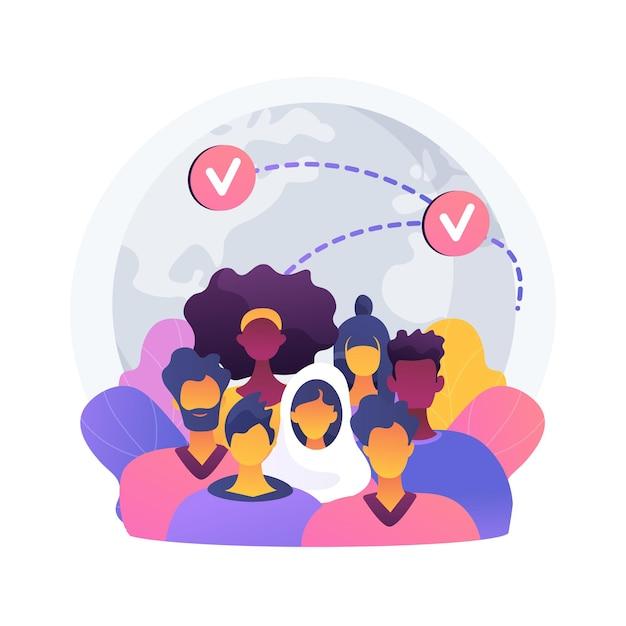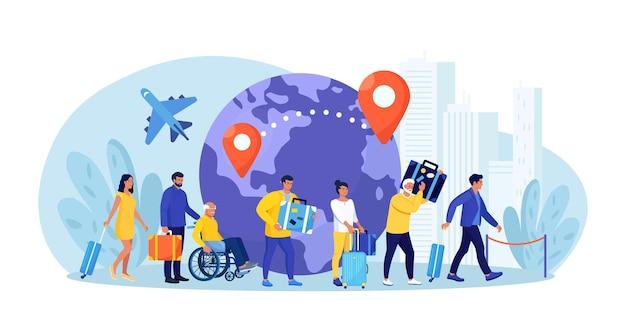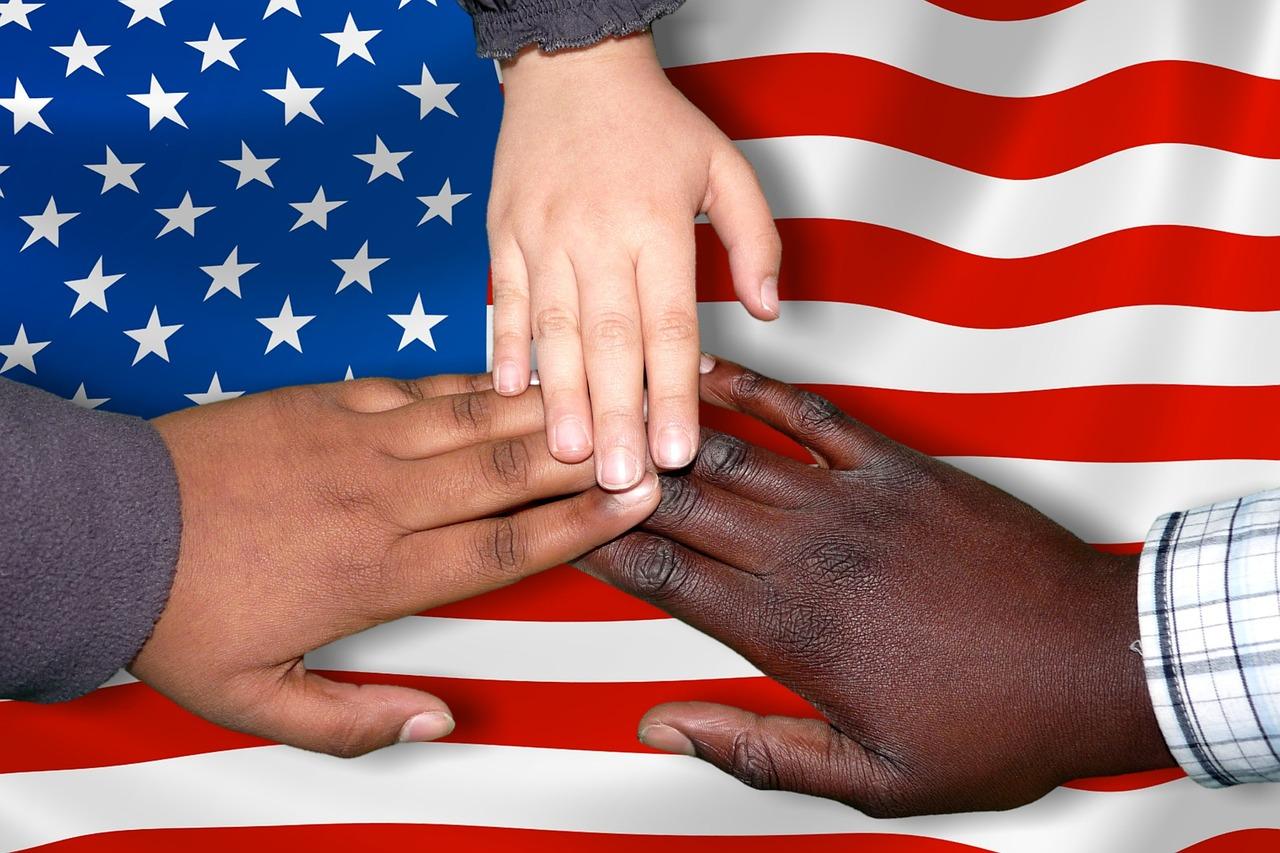Have you ever thought about the fact that, at some point in history, your ancestors migrated to the land you currently call home? And even if you are a native resident of the place you were born, you are still part of a global community of migrants. In fact, humans have been migrating across the world for thousands of years, making it an innate part of our existence.
But what does “immigrant” actually mean, and why is it such an important topic? In this blog post, we will explore the concept of immigration and why it should be considered a human right. We will also delve into some interesting facts and statistics about the number of immigrants around the world, and share some powerful quotes about the value of immigrant cultures. Join us as we dive into this fascinating and significant topic.
We All Have Immigrant Roots
When it comes to immigration, it’s easy to think of it as a black and white issue. You’re either an immigrant or you’re not. However, the truth is that we are all immigrants in some way or another. Whether your great grandparents arrived on the Mayflower or your parents moved to a new country for work, everyone has a story of migration.
The Far-Reaching Effects of Migration
Immigration does not only affect the person moving but also everyone in their life. For example, if your aunt had never married and moved to the United States, you would not be here today! Every person in your family tree has had an impact on your existence, which is why it’s essential to understand and appreciate the struggles they faced.
Redefining the American Identity
America is known as a melting pot of cultures, and it’s no wonder why. The United States has a reputation for being a nation of immigrants. Almost every person in America has a unique history that resulted in their life here. It’s time to embrace our immigrant heritage and find new ways to celebrate the diversity that makes us stronger.
Immigration Brings Opportunities
Immigrants have a significant impact on the economy of the country they move to. They can bring new skills or business opportunities that may not have existed before. If your family moved to a new country, it’s likely that they faced significant challenges, but those challenges contributed to their perseverance and success.
Supporting Immigrants Is Critical
It’s crucial to support and assist immigrants through the challenging times that come with their journey. We cannot abandon those who come to our countries in search of new opportunities, a better life, or to find safety from persecution. Instead, we should do all we can to support these individuals and help them integrate into our communities.
Embrace Your Roots
If you’re an immigrant or a descendant of one, don’t forget to embrace your heritage. Your family’s journey to a new country is a significant part of your history. Share your family stories, try the food of your ancestors and learn about their traditions. By celebrating our multicultural backgrounds, we can embrace the diversity that makes us unique and bring us together.
In conclusion, we are all immigrants in some way or another, and it’s time to realize how much our ancestry has shaped our lives. By celebrating the diversity that exists in our families, communities, and beyond, we can work to create a more inclusive and educated society.
How is everyone a migrant
Let’s face it; we’ve all got a little bit of migrant in us. Whether it’s our great-great-grandparents that sailed over on the Mayflower, or our parents that moved to the city for a better life, migration is part of our DNA. Heck, even our ancestors left Africa and spread themselves all over the planet! So, what makes us all migrants?
The human drive to explore
Ever since we crawled out of the primordial ooze, humans have had an insatiable curiosity to explore new horizons. We were never content to just stay in one place, we had to see what was over the next hill, across the river, or beyond the sea. Our restless nature has led us to travel far and wide, seeking adventure and new opportunities.
Seeking opportunities
Just like our forefathers, we’re hardwired to seek out new opportunities. Humans have an innate desire for a better life, and if we can’t find it in our current surroundings, we’ll forge ahead and find it somewhere else. Whether it’s a new job, a better climate, or a fresh start, we all want to improve our lives and the lives of our loved ones.
Adaptability
If there’s one thing you can say about humans, it’s that we’re adaptable. We’re able to adjust to new environments, new cultures, and new ways of life. From learning a new language to mastering a new skill, humans have an incredible capacity to adapt and thrive in new surroundings.
So, there you have it. We’re all migrants at heart, driven by a desire to explore, seek out new opportunities, and adapt to new environments. Migration is part of who we are, and it’s what makes us unique. So, next time you meet someone new, remember that you’ve got something in common with them: you’re both migrants on the journey of life.
Is Immigration a Human Right
Immigration has been a hotly debated topic in recent times, with some arguing that it is a fundamental human right that should be protected and respected. Others, however, feel that it is a privilege that should be earned and granted only under certain conditions. So, which is it?
Defining Human Right
To understand whether or not immigration is a human right, we first need to define what we mean by “human right.” According to the United Nations, human rights are “rights inherent to all human beings, regardless of race, sex, nationality, ethnicity, language, religion, or any other status.”
The Right to Freedom of Movement
One of the fundamental human rights recognized by the United Nations is the right to freedom of movement. This right is enshrined in Article 13 of the Universal Declaration of Human Rights, which states that “everyone has the right to freedom of movement and residence within the borders of each state and the right to leave any country, including his own, and to return to his country.”
Why Immigration is a Human Right
Immigration can be seen as an extension of the right to freedom of movement. If individuals have the right to travel freely within and between states, then why should they be denied the right to move permanently to another country if they wish to do so?
Furthermore, denying people the right to immigrate can result in serious human rights violations. For example, if individuals are fleeing persecution, war, or other forms of violence in their home countries, denying them the right to seek refuge in another country could put their lives in danger.
Based on these arguments, it seems clear that immigration can indeed be considered a human right. While countries may have the right to set certain conditions or restrictions on immigration, they must do so in a way that respects and upholds individuals’ basic human rights.
What is Said to be the Immigration
As the saying goes, “we are all immigrants” – but what does “immigration” actually mean? Is it just about moving from one place to another, or is there more to it?
Understanding the Term
At its core, immigration refers to the process of moving from one country to another with the intention of establishing permanent residence. This can happen for a number of reasons, including seeking better economic opportunities, escaping persecution or violence, or simply wanting to experience a different way of life.
The Myths and Realities of Immigration
Unfortunately, there are many myths and misconceptions surrounding the immigration process. Some people believe that immigrants are lazy and drain resources from their host countries, while others think that immigration leads to increased crime rates and social unrest.
In reality, immigrants often contribute positively to the economy and society of their new homes, bringing new skills, perspectives, and ideas. Additionally, studies have shown that immigration can actually lead to decreased crime rates in certain areas.
The Complexities of the Immigration Process
While the idea of moving to another country may seem straightforward, the reality is that the immigration process can be incredibly complex and daunting. It often involves lengthy paperwork, background checks, and interviews, as well as significant financial and logistical barriers.
Moreover, the immigration laws and policies of different countries can vary widely, and the political climate around immigration can change rapidly and unpredictably. This means that even people with valid reasons for seeking immigration can face significant challenges and uncertainty.
In short, “immigration” is much more than just a simple concept. It involves a complex web of legal, economic, social, and political factors, as well as deeply personal reasons and motivations. By understanding the realities and complexities of immigration, we can work towards creating more just and empathetic societies for everyone.
How Much of the World is Immigrants
Have you ever wondered how many people are actually immigrants in the world? Well, wonder no more! Let’s dive into some interesting statistics and learn more about the global immigrant population.
The Total Global Immigrant Population
According to the United Nations, there were approximately 272 million international migrants worldwide in 2019. That’s a lot of people! To put it into perspective, this number is equivalent to 3.5% of the world’s population. The majority of these migrants (about 81%) live in developed countries, while the remaining 19% reside in developing countries.
Countries with the Highest Immigrant Population
Which countries have the most immigrants? As of 2021, the United States ranks as the top country with the highest number of migrants, followed by Germany, Saudi Arabia, Russia, and the United Kingdom. Together, these five countries host approximately 26% of the global migrant population.
What Motivates People to Migrate
People move from their home countries for various reasons. Some migrate for economic reasons, such as seeking better job opportunities or higher wages. Others move to reunite with their family members in another country. And some people migrate due to political instability and conflicts.
Consequences of Immigration
Immigration has a significant impact on the economy and society of host countries. While it can lead to demographic changes, cultural diversity, and economic growth, it can also cause tensions between different cultural groups and result in xenophobic attitudes.
In conclusion, the global immigrant population is significant and growing. People migrate for various reasons and the consequences of immigration are complex. Regardless, immigration is here to stay, and it’s essential to create policies that support the integration of immigrants into society and ensure that they are treated fairly.
What are Some Quotes About the Importance of Immigrants
Immigrants are some of the most important people in America, and their contributions to our country are tremendous. Whether they are coming to the United States for work or to escape persecution or violence, immigrants enrich the fabric of our society and make us stronger. Here are some inspiring quotes that demonstrate the importance of immigrants.
“Immigrants have always been a part of the American story.” – President Barack Obama
President Obama recognizes the crucial role that immigrants have played in shaping American history. From the first settlers to today’s modern immigrants, immigrants have made America what it is.
“Immigration is the sincerest form of patriotism.” – President John F. Kennedy
President Kennedy famously called immigration “the sincerest form of patriotism.” This quote highlights the fact that when someone decides to leave their home country and come to America, they are making a bold statement about their love of freedom and desire to be a part of the American dream.
“Immigrants are the bravest people I know.” – Chef José Andrés
Chef José Andrés is known for his humanitarian efforts and advocacy for immigrants. He recognizes the courage it takes to leave everything behind and start anew in a foreign country.
“The American Dream is not a sprint, or even a marathon, but a relay.” – Secretary of Labor Alexander Acosta
Secretary Acosta recognizes that immigrants have always played a vital role in America’s progress. Whether through hard work, innovation, or entrepreneurship, immigrants have been passing the baton of the American Dream for generations.
“We all came from diverse cultures, different backgrounds and histories. But ultimately, we are all in the same boat.” – IBM CEO Ginni Rometty
IBM CEO Ginni Rometty recognizes that immigrants are essential to the success of businesses and our country. By bringing diverse perspectives and skills to the table, immigrants help drive innovation and create new opportunities for growth.
In conclusion, these quotes collectively emphasize the importance of immigrants and the positive impact they have on America. Immigrants are not just a group of people seeking a new home, they are a vital part of our society, and we need to recognize and cherish their contribution.



